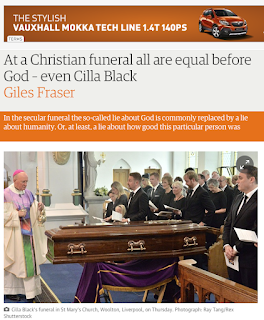I’ve got a lot of time for the Reverend Giles Fraser, or ‘The Loose Canon’ as he calls himself, but I was surprised to read his most recent article in The Guardian, in which he used Cilla Black’s funeral to say that in secular funerals, “the so-called lie about God is commonly replaced by another sort of lie, a lie about humanity. Or, at least, a lie about how good this particular person was”.
It is, of course, not unreasonable that the oration is designed to accentuate the positive and eliminate the negative. But this can sometimes lead to a peculiar emotional disconnect with reality. Which is why, in so many secular funerals, we no longer recognise the person being buried”.
It is, of course, not unreasonable that the oration is designed to accentuate the positive and eliminate the negative. But this can sometimes lead to a peculiar emotional disconnect with reality. Which is why, in so many secular funerals, we no longer recognise the person being buried”.
It did make me wonder what sort of secular funerals he’s witnessed, because what he describes is precisely the opposite of my experience. What I do – like every other celebrant I know – is try to tell the truth about ‘the person being buried’ so that everyone there recognises them, and feels that their life has been honoured and respected, and that is why I – and every other celebrant I know – spend a lot of time with the family of the deceased, deciding how much truth we can tell, which isn’t always easy.
When I meet a family, I sometimes talk about ‘the elephant in the room’ – if you don’t know the phrase, it means an obvious truth that’s being deliberately ignored. When someone has abandoned their children, or destroyed their life through drink or drugs, the temptation is very much there to avoid talking about it, and I entirely understand, but I when I suggest that everyone who’s going to turn up on the day knows the whole difficult story all too well, I usually find that the family is happy to acknowledge it: my job then is to find a form of words that expresses it with sensitivity.
I remember a funeral I conducted a while ago for a woman who died in her mid-thirties as a consequence of systemic drug and alcohol abuse: her mother, and all of her former friends were in deep shock. We agreed that I could and should talk about it openly, and I remember the faces of everyone there when I did so: suddenly they realised I wasn’t giving them a pile of old flannel. I was talking about the person they knew and loved, with her faults as well as her strengths.
Giles Fraser’s article provoked quite a storm of protest in the letters column, which you can read here. I particularly liked what Mike Granville wrote. He was a celebrant himself, and this passage from his letter rung very true with me.
“Fraser also seems to think also that we secular-humanists see only the good in people. Not true! I’ve had lengthy conversations with families who have made it plain that if I say what a nice person this was, people will laugh. They get the truth from me – not necessarily all of it, but certainly no glazing over”.

0 Comments Leave a comment